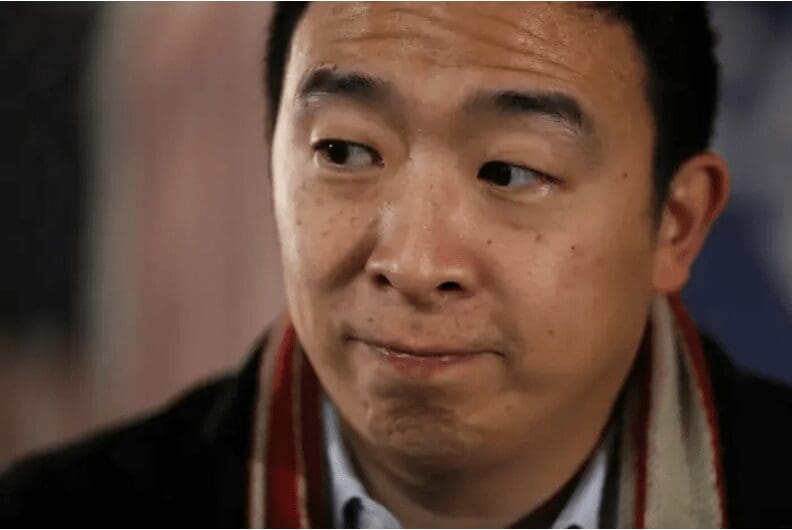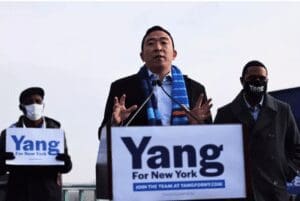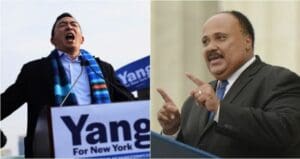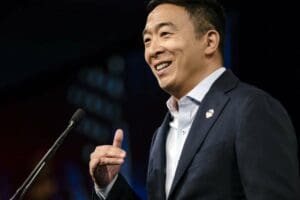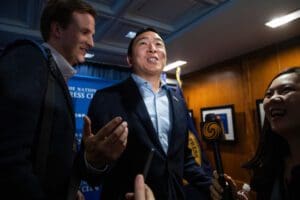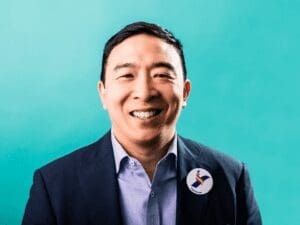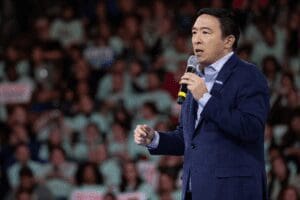MANCHESTER, New Hampshire — Andrew Yang — the unknown entrepreneur turned Democratic presidential candidate — is ending his presidential campaign.
But the candidate’s success might have been the biggest political surprise of 2019: Yang carried a message about individuals being more than economic metrics and evangelized a monthly payment to every American — otherwise known as universal basic income — all the way to the Democratic debate stage.
“That will be the most important legacy: If we accelerate the end of poverty in this country — which I believe we already have, because I don’t think this idea is going to go away,” he said in a phone interview on Tuesday, from the Puritan Conference Center in Manchester, where Yang held his election night rally.
Yang, 45, believes his campaign advanced a conversation about poverty and technology, and perhaps changed the way candidates can talk to voters in the 2020s. He outlasted governors and senators in the nominating process, and raised more money than many of them, too. His bro-ish persona, professed affinity for many of the other candidates, and easy jokes made him popular among Democrats, especially in the early states. He went from Joe Rogan’s podcast and Twitter memes to raising $16.5 million in the fourth quarter of 2019. Now, according to a senior aide, he’s considering starting an organization to do down-ballot work this year.
“If anyone had lined up a set of Washington journalists 18 months ago and lined up the candidates, no one would have bet on that,” he said. “One of the things this campaign demonstrated [is] that the institutional gateways are not what they once were.”
“It’s amazing to imagine a campaign that started with my Google contact list and now has over 400,000 donors and millions of Americans who support us,” he added.
Frequently proclaiming that the opposite of Donald Trump is “an Asian man who likes math,” Yang frustrated some, both Asian American and non–Asian American alike, prompting a wider conversations about identity that included Yang himself at times. On Tuesday, he said he’s “proud of being the first Asian American man to run for president as a Democrat.”
On the debate stage, Yang relentlessly pitched UBI and the “fourth industrial revolution” of automated manufacturing and artificial intelligence. In person, Yang’s campaign message was often much broader: He talks often about the inadequacy of standard economic metrics to capture the well-being of the populace, arguing that the importance of gross domestic product in public life creates a standard where, unless you contribute to the GDP, your humanity doesn’t count. On the trail, he talks a lot about the death of retail jobs, and parents who worry about how phones affect their kids. Yang and his wife, Evelyn, did events directed toward the parents of autistic children and those with special needs. (Their elder son is autistic.) The Yangs also both spoke about Evelyn Yang’s experience after an obstetrician sexually abused her.
“We’ve been so collectively conditioned that the market knows what we’re all worth,” Yang said on Tuesday. “That’s going to be more and more terrible for more and more people overtime as technology gets stronger and faster.”
He said it “infuriates” him that politicians still “hew to the” same conversations. “My wife said, ‘Why is [it] that ideas that were so mainstream in the ’60s and ’70s now seem to require a futuristic Asian man drag us into the light?’” he said.
Yang feels his campaign connected with people who are often “disengaged” from politics, “people who consider themselves introverts, people who have family members who have special needs.”
“I felt great about that,” he said. “I feel great when supporters tell me that the campaign lifted them out of a depression or made them feel better about their future.”
Over the last year, Yang’s nonpolitical personality provided a litany of videos across a range of emotions: crowdsurfing in California, dancing in an aerobics class in South Carolina, putting on a choir robe at church in Iowa, and breaking down in tears while talking with a woman who’d lost her son to gun violence last summer. He drew praise, too, for talking about tech issues — like the effect of Amazon on retail — that seemed more engaged with the current dynamic of tech.
“The other legacy I’m proud of is having a different approach to politics where people realize that you can speak to people like people,” Yang said on Tuesday.
During campaign events, he’d often do call-and-response with people in the audience, take questions, and make extensive jokes. “When I speak at an event and some of my fellow candidates speak at an event, I feel like we’re sometimes speaking different languages,” he said.
“And the language that I speak is just English,” he said, laughing. “With some numbers thrown in, too.”
The surprise success of his campaign has already engendered a conversation about what’s next. In their presidential endorsement, the New York Times editorial board wrote that Yang is “engaging and enthusiastic” and that they hoped “he decides to get involved in New York politics.” Yang himself alluded to another campaign in four years during a staff call recently.
At the moment, according to a senior aide, Yang has tentative plans for a new political organization, perhaps focused on down-ballot work to promote candidates with Yang’s “humanity first” values and policies.
“He wants to keep the conversation going and is exploring ways to do so,” the aide said.
But for now, it’s just the end of the campaign. Yang has mixed emotions.
“There’s part of me that feels disappointed, like I didn’t fulfill some people’s goals for this campaign,” Yang allowed, though he said he tries to maintain a positive outlook.
“There’s also a competitive part of me, too — like I can’t believe I lost to these people.”










